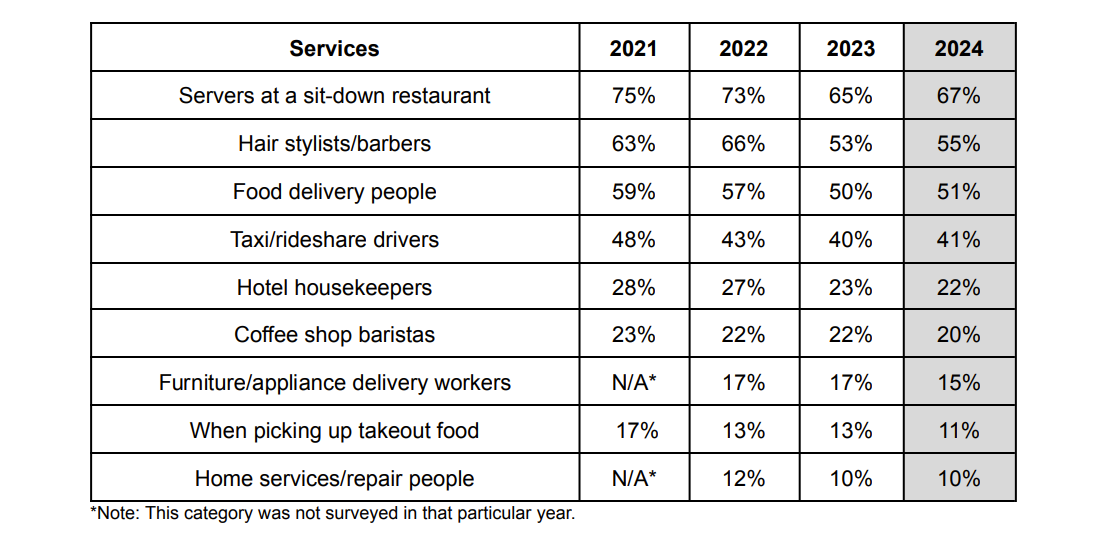Who Are the Worst Tippers?
Who are the worst tippers? A new study found that while most Americans have a negative view of tipping, some are tipping worse than others.


Profit and prosper with the best of Kiplinger's advice on investing, taxes, retirement, personal finance and much more. Delivered daily. Enter your email in the box and click Sign Me Up.
You are now subscribed
Your newsletter sign-up was successful
Want to add more newsletters?

Delivered daily
Kiplinger Today
Profit and prosper with the best of Kiplinger's advice on investing, taxes, retirement, personal finance and much more delivered daily. Smart money moves start here.

Sent five days a week
Kiplinger A Step Ahead
Get practical help to make better financial decisions in your everyday life, from spending to savings on top deals.

Delivered daily
Kiplinger Closing Bell
Get today's biggest financial and investing headlines delivered to your inbox every day the U.S. stock market is open.

Sent twice a week
Kiplinger Adviser Intel
Financial pros across the country share best practices and fresh tactics to preserve and grow your wealth.

Delivered weekly
Kiplinger Tax Tips
Trim your federal and state tax bills with practical tax-planning and tax-cutting strategies.

Sent twice a week
Kiplinger Retirement Tips
Your twice-a-week guide to planning and enjoying a financially secure and richly rewarding retirement

Sent bimonthly.
Kiplinger Adviser Angle
Insights for advisers, wealth managers and other financial professionals.

Sent twice a week
Kiplinger Investing Weekly
Your twice-a-week roundup of promising stocks, funds, companies and industries you should consider, ones you should avoid, and why.

Sent weekly for six weeks
Kiplinger Invest for Retirement
Your step-by-step six-part series on how to invest for retirement, from devising a successful strategy to exactly which investments to choose.
If you find yourself experiencing tip fatigue, you’re not alone. Nearly 3 in 5 U.S. adults (59%) have a negative view of tipping, and 35% of Americans believe tipping has "gotten out of control," according to a recent study from Bankrate. The study, which questioned 2,445 U.S. adults from April 29 to May 1, 2024, also found which groups of people tip the most versus who tips the least.
So while people are still leaving tips, who they tip, and how much, depends on several factors, including quality of service, complexity of order and service and wait times. According to Bankrate, 55% of adults always leave a tip or gratuity for hair stylists, compared to only 20% for baristas and 11% when picking up take-out.
There is one apparent certainty, though: "Tipping is a hot-button issue that doesn’t seem to be going away anytime soon.” says Ted Rossman, senior industry analyst at Bankrate.
From just $107.88 $24.99 for Kiplinger Personal Finance
Become a smarter, better informed investor. Subscribe from just $107.88 $24.99, plus get up to 4 Special Issues

Sign up for Kiplinger’s Free Newsletters
Profit and prosper with the best of expert advice on investing, taxes, retirement, personal finance and more - straight to your e-mail.
Profit and prosper with the best of expert advice - straight to your e-mail.
Changes in tipping
Since 2023, the percentage of people who always tip in certain categories has fluctuated. Between 2023 and 2024, there's been an increase in the number of people always tipping in the following categories.
- Servers at a sit-down restaurant: 67%; up from 65%
- Hair stylists/barbers: 55%; up from 53%
- Food delivery people: 51%; up from 50%
- Taxi/rideshare drivers: 41%; up from 40%
And a decrease in the number of people always tipping in these categories.
- Hotel housekeepers: 22%; down from 23%
- Coffee shop baristas: 20%; down from 22%
- Furniture/appliance delivery workers: 15%; down from 17%
- When picking up takeout food: 11%; down from 13%

However, despite the increases from 2023 to 2024, if you compare these numbers to data from 2021, you'll notice an overall decrease. For example, while the number of individuals who always tip their server at sit-down restaurants has increased from 2023, going from 65% to 67%, it's still down from 73% in 2022, 75% in 2021 and 77% in 2019.
Negative views on tipping
Overall, Americans view tipping negatively for a number of reasons. Mark Hamrick, Bankrate senior economic analyst told Kiplinger: “In the past couple of years, consumers across all categories have been slammed by high and sustained inflation. In some cases, individuals may be deciding to be more or less generous with their tips as they try to manage through these financial headwinds.”
Here’s a breakdown of why people view tipping in a negative light, according to Bankrate.
- 37% believe businesses should pay their employees better, rather than relying so much on tips.
- 35% believe that tipping culture has gotten out of control.
- 34% are annoyed about the pre-entered tip screens they encounter at coffee shops, food trucks and elsewhere.
- 14% would be willing to pay higher prices in order to do away with tipping.
- 11% are confused about who and how much to tip.
Out of the 35% who feel that “tipping culture” has gotten out of control, this is mostly a view held among older generations, with 46% of baby boomers and 40% of Gen X agreeing with the sentiment, compared to only 23% of Gen Z and 27% of millennials.
Who are the worst tippers?
Last year, Bankrate's 2023 tipping study found that surprisingly, the worst tippers across multiple service categories were Gen Zers (ages 18-26), millennials (ages 27-42) and men.
The 2024 study yielded similar results. When it comes to sit-down restaurants, 71% of women and only 63% of men always tip. 35% of Gen Zers always tip when dining in, compared to 56% of millennials, 78% of Gen Xers and 86% of baby boomers.
“Those who are just starting out with their personal financial journeys, including careers, very often have less resources and flexibility with their money," Hamrick told Kiplinger. "By contrast, very broadly speaking, those who are more senior tend to have more established careers as well as more savings both for emergencies and retirement,”
Related Content
Profit and prosper with the best of Kiplinger's advice on investing, taxes, retirement, personal finance and much more. Delivered daily. Enter your email in the box and click Sign Me Up.

Erin pairs personal experience with research and is passionate about sharing personal finance advice with others. Previously, she was a freelancer focusing on the credit card side of finance, but has branched out since then to cover other aspects of personal finance. Erin is well-versed in traditional media with reporting, interviewing and research, as well as using graphic design and video and audio storytelling to share with her readers.
-
 3 Reasons to Use a 5-Year CD As You Approach Retirement
3 Reasons to Use a 5-Year CD As You Approach RetirementA five-year CD can help you reach other milestones as you approach retirement.
-
 Your Adult Kids Are Doing Fine. Is It Time To Spend Some of Their Inheritance?
Your Adult Kids Are Doing Fine. Is It Time To Spend Some of Their Inheritance?If your kids are successful, do they need an inheritance? Ask yourself these four questions before passing down another dollar.
-
 4 Estate Planning Documents Every High-Net-Worth Family Needs
4 Estate Planning Documents Every High-Net-Worth Family NeedsThe key to successful estate planning for HNW families isn't just drafting these four documents, but ensuring they're current and immediately accessible.
-
 3 Reasons to Use a 5-Year CD As You Approach Retirement
3 Reasons to Use a 5-Year CD As You Approach RetirementA five-year CD can help you reach other milestones as you approach retirement.
-
 How to Watch the 2026 Winter Olympics Without Overpaying
How to Watch the 2026 Winter Olympics Without OverpayingHere’s how to stream the 2026 Winter Olympics live, including low-cost viewing options, Peacock access and ways to catch your favorite athletes and events from anywhere.
-
 Here’s How to Stream the Super Bowl for Less
Here’s How to Stream the Super Bowl for LessWe'll show you the least expensive ways to stream football's biggest event.
-
 The Cost of Leaving Your Money in a Low-Rate Account
The Cost of Leaving Your Money in a Low-Rate AccountWhy parking your cash in low-yield accounts could be costing you, and smarter alternatives that preserve liquidity while boosting returns.
-
 This Is How You Can Land a Job You'll Love
This Is How You Can Land a Job You'll Love"Work How You Are Wired" leads job seekers on a journey of self-discovery that could help them snag the job of their dreams.
-
 We Inherited $250K: I Want a Second Home, but My Wife Wants to Save for Our Kids' College.
We Inherited $250K: I Want a Second Home, but My Wife Wants to Save for Our Kids' College.He wants a vacation home, but she wants a 529 plan for the kids. Who's right? The experts weigh in.
-
 4 Psychological Tricks to Save More in 2026
4 Psychological Tricks to Save More in 2026Psychology and money are linked. Learn how you can use this to help you save more throughout 2026.
-
 Why Your Home Insurance Might Not Protect You If Someone Else Lives There
Why Your Home Insurance Might Not Protect You If Someone Else Lives ThereLetting a relative stay in a second home or inherited property can quietly change your insurance coverage and leave you exposed to costly liability claims.